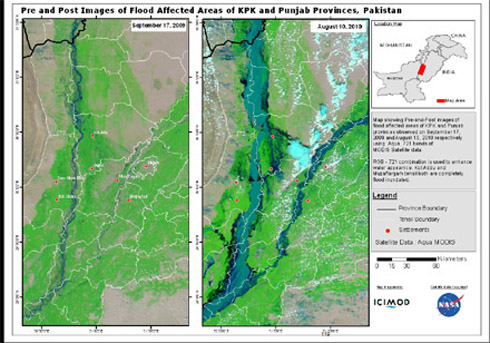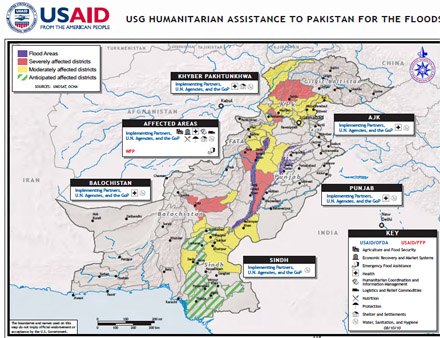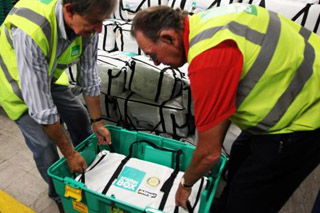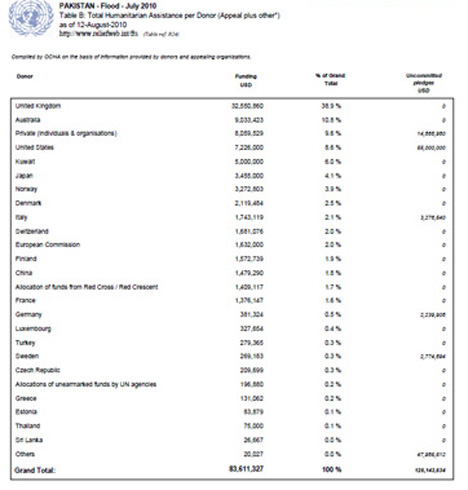Navigation
Relief Efforts for Flood Victims in Pakistan
A list of humanitarian organizations that are accepting cash donations for flood response efforts in Pakistan can be found at www.interaction.org.
A list of humanitarian organizations that are accepting cash donations for flood response efforts in Pakistan can be found at www.interaction.org.
Daily updates and information on organizations responding to the humanitarian situation in Pakistan on the United Nations website ReliefWeb, at www.reliefweb.int/, which "serves the needs of the Humanitarian Relief Community."
 |
The Government of Pakistan estimates that more than 14 million people have now been affected, to different degrees of severity, by the floods, which have devastated large parts of the country from north to south. The emergency is still evolving, with continued rainfall, more areas at high risk of flooding, and hundreds of thousands of people on the move. Urgent needs include shelter, food and medicine.
On Wednesday, August 12th, 2010, the spokesperson for the United Nation's Secretary-General, Martin Nesirky, announced the launching of a United Nation's emergency appeal emergency to meet humanitarian needs of millions of people in Pakistan. He said, "The United Nations and Pakistan just launched an emergency response plan for $459.7 million over the coming weeks, to meet the urgent humanitarian needs of millions of people affected by the floods there."
The death toll has so far been relatively low compared to other major natural disasters, but the numbers affected are extraordinarily high," said John Holmes, the Emergency Relief Coordinator. He warned, “If we don’t act fast enough, many more people could die of diseases and food shortages.”
UN agencies continue to work to assist the people affected by the floods and called for additional international assistance. The World Food Programme (WFP) says it is mobilizing all possible resources to ensure that those affected receive food assistance as swiftly as possible and is planning to have reached 2 million people with food by 20 August. Rapid food assessments have been concluded across Khyber Pakhtunkhwa (KPK) and ndicate that some 2.6 million people need food.
Despite the adverse weather, by Tuesday evening, WFP had reached nearly 370,000 people with one-month food supplies in the worst affected areas of KPK. WFP is also scaling up food assistance to flood-affected communities in Punjab, Sindh and Balochistan.
UNICEF also says that 6 million children have been affected by the floods in Pakistan, with some 2.7 million children in need of urgent, life-saving assistance. Hundreds of thousands have received humanitarian aid, but millions more urgently need shelter, food, water, and health care. Flooding could worsen considerably in the coming days, especially in parts of Sindh.
"This is the biggest natural disaster to hit Pakistan and this region in living memory, bigger than the Tsunami or the earthquake, with millions of children and women struggling to survive in dire conditions. It is a race against time as we rush to deliver supplies to affected populations. The waters are still rising and we are bracing for flood waves as rivers overflow and the rains continue," said Martin Mogwanja, UNICEF Representative in Pakistan.
"Shelter is the most urgent need, while food, water, and health care are also critical. Right now we need to save lives and create temporary living conditions for the 1.8 million homeless. It is a massive task and we are not there yet. Once we are, we can begin to think about the longer-term recovery of regions in Pakistan which have suffered widespread devastation," added Mogwanja.
UNICEF is sending in humanitarian supplies for health, nutrition, water and sanitation, child protection, and education.
**There is a UNICEF video at the end of this article.**
UN Refugee Agency (UNHCR) trucks that had been trapped for a week by landslides finally reached Quetta on August 11, 2010, carrying all-weather family tents for thousands of people in Balochistan Province made homeless by the floods. A further five trucks are expected to arrive in Quetta over the next hours, bringing help to a further 20,000 people.
UNHCR has provided emergency shelter and relief assistance to over 160,000 people, but the Refugee Agency is appealing for more funds in order to help meet the urgent needs of a further 560,000 people.
 |
More news on aid efforts:
United States Agency for International Development (USAID) Sends Additional Aid to Pakistan Flood Victims
According to United States Agency for International Development (USAID), as of 9 August 2010, the U.S. has supplied food to about 158,500 people through its partnership with the World Food Program and is currently reaching about 35,000 to 49,000 people per day.
The United States Agency for International Development (USAID) announced on the 10th of August 2010 an expansion of its ongoing humanitarian assistance for victims of flooding in Pakistan, which has included providing shelter materials, emergency food supplies and preventative medical care to curb potential disease outbreaks.
The additional $20 million brings the total financial assistance to date from the United States to $55 million. As the flood waters recede and the overall needs in Pakistan become better known, these contributions may continue to grow according to USAID. This new money will be used to expand existing programs and activities through flood-affected regions of the country, including in the south, where there has been a light humanitarian presence until now. The initial funding was used for flood assistance in parts of Khyber Pakhtunkhwa Province, where USAID is already working with a network of NGOs and UN agencies.
USAID reports that it continues to actively monitor the flood's path. As it moves south, the additional funding announced today will be used to expand grants to NGOs and UN Agencies to allow them to work further south, in Sindh and Baluchistan Provinces.
This assistance will be provided through the international humanitarian community, as well as through an existing mechanism that provides funding to Pakistani humanitarian organizations, which have unique access to many of the flood-affected areas.
A Disaster Assistance Response Team is on the ground and will be expanding to eleven disaster assistance experts by the end of the week.
The USAID says that most effective way people can assist relief efforts is by making cash contributions to humanitarian organizations that are conducting relief operations. A list of humanitarian organizations that are accepting cash donations for flood response efforts in Pakistan can be found at www.interaction.org. Information on organizations responding to the humanitarian situation in Pakistan may be available at www.reliefweb.int.
Cash donations allow aid professionals to procure the exact items needed (often in the affected region); reduce the burden on scarce resources (such as transportation routes, staff time, warehouse space, etc); can be transferred very quickly and without transportation costs; support the economy of the disaster-stricken region; and ensure culturally, dietary, and environmentally appropriate assistance.
The Government of Switzerland reports helping
thousands of flood victims in Pakistan
Switzerland is helping the flood victims by supplying materials and making contributions to international organizations.
A three-person evaluation mission of the Swiss Humanitarian Aid Unit visited the Swat valley from 5 to 7 August. Together with the Swiss partner organization Intercooperation, they assessed immediate needs. On the basis of this assessment, provisional accommodation for 1,000 families has been bought and is now being distributed. These shelter kits consist of plastic sheets, mattresses, blankets, kitchen utensils and hygiene sets.
Emergency aid measures are currently under way in which food and hygiene sets are being distributed to about 12,000 flood victims. To support multilateral partners operating in the flood areas, Switzerland is also providing 1.5 million CHF. A million francs will go to the ICRC, while 500,000 CHF will be transferred to the United Nations World Food Programme. Swiss Humanitarian Aid has also offered to send its experts to reinforce those of the UN.
Torrential rains have also hit the north west of India and at least 145 people have been killed. About 500 are still missing. Possible support measures are currently being considered by the Coordination Office of the Swiss Agency for Development and Cooperation (STC).
ShelterBox of Cornwall, UK, sends relief boxes for the floods in Pakistan.
 |
| Boxes are packed at ShelterBox HQ Photograph courtesy of ShelterBox |
The UK based disaster relief agency have already distributed nearly 1500 tents across the affected areas in Pakistan. These tents were taken from pre-positioned stock sent to the North and the South of the country in June.
200 further ShelterBoxes are being sent to Pakistan tomorrow to be distributed by the charities trusted in country partners the National Rural Support Program (NRSP) who they have worked with for over 5 years.
Preparations are underway to increase the response over the coming days and weeks, as the operations team constantly review the situation on the ground.
Governments current donations and pledged amounts.
 |
Source: www.reliefweb.int/fts (Table ref. R24)
UNICEF's David Bull appeals for funds for children affected by the floods in Pakistan. The number of people affected is now more than the 2004 Boxing Day tsunami and the destruction of property is nearly as bad as this year's Haiti earthquake.
Search
Latest articles
Agriculture
- World Water Week: Healthy ecosystems essential to human health: from coronavirus to malnutrition Online session Wednesday 24 August 17:00-18:20
- World Water Week: Healthy ecosystems essential to human health: from coronavirus to malnutrition Online session Wednesday 24 August 17:00-18:20
Air Pollution
- "Water and Sanitation-Related Diseases and the Changing Environment: Challenges, Interventions, and Preventive Measures" Volume 2 Is Now Available
- Global Innovation Exchange Co-Created by Horizon International, USAID, Bill and Melinda Gates Foundation and Others
Biodiversity
- It is time for international mobilization against climate change
- World Water Week: Healthy ecosystems essential to human health: from coronavirus to malnutrition Online session Wednesday 24 August 17:00-18:20
Desertification
- World Water Week: Healthy ecosystems essential to human health: from coronavirus to malnutrition Online session Wednesday 24 August 17:00-18:20
- UN Food Systems Summit Receives Over 1,200 Ideas to Help Meet Sustainable Development Goals
Endangered Species
- Mangrove Action Project Collaborates to Restore and Preserve Mangrove Ecosystems
- Coral Research in Palau offers a “Glimmer of Hope”
Energy
- Global Innovation Exchange Co-Created by Horizon International, USAID, Bill and Melinda Gates Foundation and Others
- Wildlife Preservation in Southeast Nova Scotia
Exhibits
- Global Innovation Exchange Co-Created by Horizon International, USAID, Bill and Melinda Gates Foundation and Others
- Coral Reefs
Forests
- NASA Satellites Reveal Major Shifts in Global Freshwater Updated June 2020
- Global Innovation Exchange Co-Created by Horizon International, USAID, Bill and Melinda Gates Foundation and Others
Global Climate Change
- It is time for international mobilization against climate change
- It is time for international mobilization against climate change
Global Health
- World Water Week: Healthy ecosystems essential to human health: from coronavirus to malnutrition Online session Wednesday 24 August 17:00-18:20
- More than 400 schoolgirls, family and teachers rescued from Afghanistan by small coalition
Industry
- "Water and Sanitation-Related Diseases and the Changing Environment: Challenges, Interventions, and Preventive Measures" Volume 2 Is Now Available
- Global Innovation Exchange Co-Created by Horizon International, USAID, Bill and Melinda Gates Foundation and Others
Natural Disaster Relief
- STOP ATTACKS ON HEALTH CARE IN UKRAINE
- Global Innovation Exchange Co-Created by Horizon International, USAID, Bill and Melinda Gates Foundation and Others
News and Special Reports
- World Water Week: Healthy ecosystems essential to human health: from coronavirus to malnutrition Online session Wednesday 24 August 17:00-18:20
- STOP ATTACKS ON HEALTH CARE IN UKRAINE
Oceans, Coral Reefs
- World Water Week: Healthy ecosystems essential to human health: from coronavirus to malnutrition Online session Wednesday 24 August 17:00-18:20
- Mangrove Action Project Collaborates to Restore and Preserve Mangrove Ecosystems
Pollution
- Zakaria Ouedraogo of Burkina Faso Produces Film “Nzoue Fiyen: Water Not Drinkable”
- "Water and Sanitation-Related Diseases and the Changing Environment: Challenges, Interventions, and Preventive Measures" Volume 2 Is Now Available
Population
- "Water and Sanitation-Related Diseases and the Changing Environment: Challenges, Interventions, and Preventive Measures" Volume 2 Is Now Available
- "Water and Sanitation-Related Diseases and the Changing Environment: Challenges, Interventions, and Preventive Measures" Volume 2 Is Now Available
Public Health
- Honouring the visionary behind India’s sanitation revolution
- Honouring the visionary behind India’s sanitation revolution
Rivers
- World Water Week: Healthy ecosystems essential to human health: from coronavirus to malnutrition Online session Wednesday 24 August 17:00-18:20
- Mangrove Action Project Collaborates to Restore and Preserve Mangrove Ecosystems
Sanitation
- Honouring the visionary behind India’s sanitation revolution
- Honouring the visionary behind India’s sanitation revolution
Toxic Chemicals
- "Water and Sanitation-Related Diseases and the Changing Environment: Challenges, Interventions, and Preventive Measures" Volume 2 Is Now Available
- Actions to Prevent Polluted Drinking Water in the United States
Transportation
- "Water and Sanitation-Related Diseases and the Changing Environment: Challenges, Interventions, and Preventive Measures" Volume 2 Is Now Available
- Urbanization Provides Opportunities for Transition to a Green Economy, Says New Report
Waste Management
- Honouring the visionary behind India’s sanitation revolution
- Honouring the visionary behind India’s sanitation revolution
Water
- Honouring the visionary behind India’s sanitation revolution
- Honouring the visionary behind India’s sanitation revolution
Water and Sanitation
- Honouring the visionary behind India’s sanitation revolution
- Honouring the visionary behind India’s sanitation revolution

